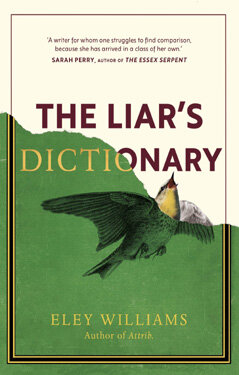Most debut novels commonly focus on autobiographical experience and while I know nothing about Eley Williams' background I wouldn't be surprised if this gifted author grew up between the covers of a giant dictionary. “The Liar's Dictionary” is quite literally the story of two lexicographers who both work for Swansby's New Encyclopedic Dictionary but their lives are separated by a century. While this might not sound like the most thrilling basis for a story, there's such charm, humour, warmth and surprisingly dramatic turns to this tale that I felt enthralled by this novel.
In alternating alphabetically-ordered chapters, we're told the stories of Winceworth, an introverted lovelorn man in 1899 who fakes having a lisp, and Mallory, an introverted very-in-love woman in the present day who is nervous about introducing her girlfriend to people as more than a flatmate. Their intensely focused endeavour is to precisely research and define every word, but language is such an unwieldy beast this task seems insurmountable and never ending. Additionally, Mallory is newly charged with hunting down the mountweazels (made-up words) in their dictionary. Where did these false words come from and why were they added? Adding to this mystery are a series of threatening phone calls Mallory receives and a strange woman with whom Winceworth becomes infatuated. These elements form a quietly mesmerising tale that's also a love letter to the English language.
Something I really appreciated about this novel was its frank depiction of a young person struggling to make a living with a certain speciality. As an intern, Mallory can barely support herself. Swansby's is an esteemed institution but given modern technology Mallory is aware of the perfunctory nature of her job in a dilapidated building with outdated facilities: “To use a computer in Swansby House was to hate the sight of a computer.” It's moving how Williams writes about the contrast between the upkeep of the building and the amount of staff at the end of the 19th century in contrast to what it's been reduced to in the 21st century.
Mallory feels like a character who was born in the wrong era, but she's also aware that this is historically a better time to be a homosexual: “it is a good time to be out. I know that. It's nice out. That's what I know to be true and yet and yet... It shouldn't define me. It definitely should.” This is one of the many complex ways this novel looks at the question of definitions and how there are deeper implications which are attached to many words. Mallory's girlfriend is unashamedly open about her sexuality in a way Mallory isn't. It's interesting how these ambiguous feelings have been expressed before in Wiliams' short story 'Smote' from her collection “Attrib”. I appreciate how this shows that being gay isn't simple no matter how progressive society becomes.
Williams' revels in language: its etymology and evolution, the way it is commonly used, its many ambiguities and the gaps where there should be certain words for an experience or sensation. There are endless examples in this novel of innovative new words the author has created or infrequently-used beautiful words that she's unearthed. She also frequently points out how words come with so many connotations. For example she writes: “A freakish weed is just a flower that has not asked permission.” There are so many words and terms whose social meaning say more than their definition, but if you look at them from a different perspective their meaning can entirely change. This feels to me to be the ultimate message of the novel. Just like the innumerable words in our language, our unique personalities can never be precisely defined.










